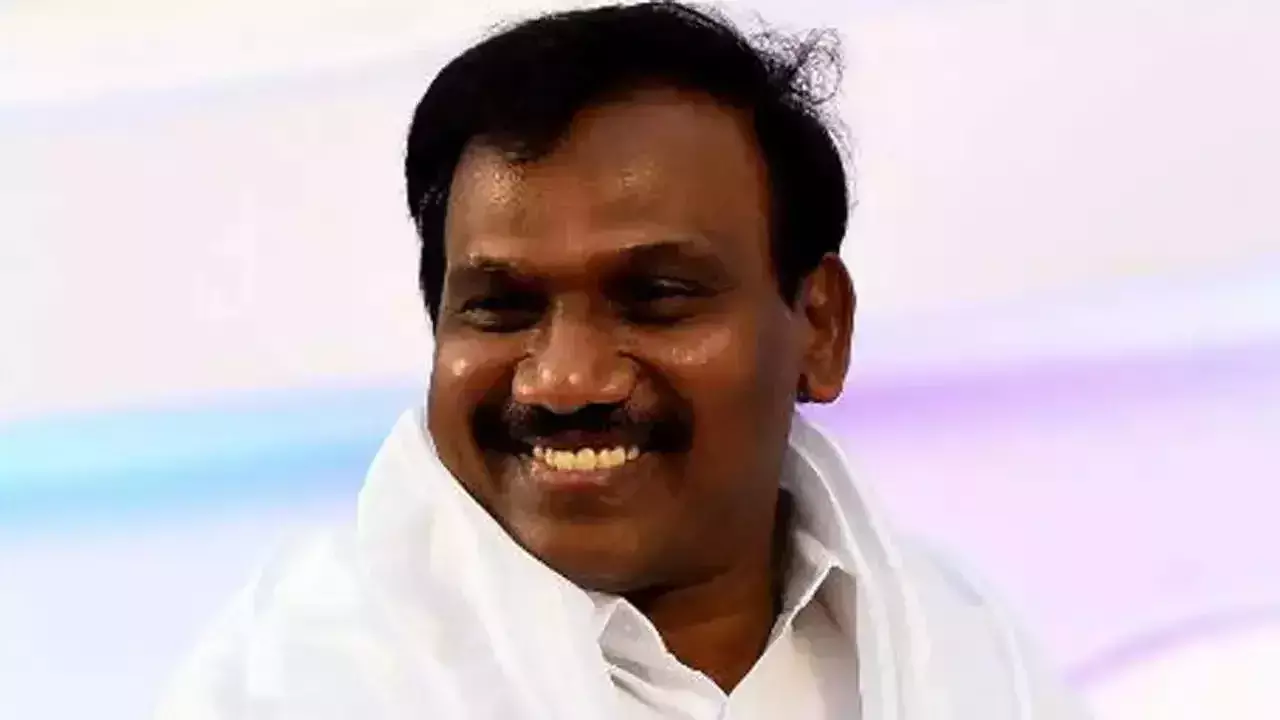TRENDING TAGS :
The Man Behind the Mandate: A. Raja — From the Banner of Social Justice to the Union Cabinet
A. Raja’s powerful political journey from a humble Dalit background to the Union Cabinet represents the core of India’s social justice movement, marked by his legislative achievements, Dalit advocacy, and legacy in Tamil Nadu.
A. Raja (PC- Social Media)
Birth and Background
Date of Birth: May 10, 1963
Place: Vellore Village, Perambalur District, Tamil Nadu
Political Party: Dravida Munnetra Kazhagam (DMK)
A. Raja is a widely recognized people’s leader who has undertaken a remarkable journey from being a flagbearer of social justice to holding prominent positions in the Union Cabinet. He has long been a prominent face of Dravidian politics, and his political career has been dedicated to amplifying the voices of India’s most marginalized communities in Parliament.
A Voice for the Marginalized
Emerging from a background in law, A. Raja entered politics with the aim of championing the rights of Dalits and underprivileged groups. He has been elected multiple times from the reserved Nilgiris (SC) constituency and has held key portfolios in ministries such as Communications, Environment, and Rural Development, carving out a significant role in national politics.
As of May 2025, Raja remains a senior leader of the DMK, representing Nilgiris in the Lok Sabha. He currently serves as the Chief Whip of the DMK Parliamentary Party in the Lok Sabha and is a member of several parliamentary committees including:
-
Committee on Personnel, Public Grievances, Law, and Justice
-
Committee on Welfare of Scheduled Castes and Scheduled Tribes
-
Defence Ministry Consultative Committee
Early Life and Family
Born into a humble Dalit family, Raja was raised under challenging circumstances. His father’s name was S.K. Andimuthu and mother’s name was Chinappillai alias Krishnamal. Despite facing socio-economic obstacles, Raja pursued education diligently and later became a practicing lawyer.
Education
He completed his B.Sc. from Arts College, Musiri (affiliated with Madras University) and subsequently earned his Bachelor of Law (B.L.) degree from Madurai Kamaraj University. The struggles he endured during his academic years deeply shaped his political ideology and commitment to social justice.
Entry into Politics
Raja entered active politics in the 1990s through the DMK. His strong stance on social justice, Dalit rights, and Tamil identity earned him the party’s trust. In 1996, he was fielded from Nilgiris (SC) constituency and won his first election to the 11th Lok Sabha.
Electoral Success and Parliamentary Roles
Since 1996, A. Raja has been elected to the Lok Sabha five times, representing Nilgiris, a seat where his popularity remains strong despite political controversies.
Timeline of Parliamentary Terms:
-
1996: Elected to the 11th Lok Sabha
-
1999: Re-elected to the 13th Lok Sabha
-
2004: Re-elected to the 14th Lok Sabha
-
2009: Elected to the 15th Lok Sabha
-
2019: Elected to the 17th Lok Sabha
-
2024: Re-elected to the 18th Lok Sabha
Ministerial Career
Raja’s tenure in the Union Cabinet includes service in several ministries, demonstrating his administrative capabilities:
-
1999–2000: Minister of State for Rural Development
-
2000–2003: Minister of State for Health & Family Welfare
-
2004–2007: Cabinet Minister for Environment & Forests
-
2007–2010: Cabinet Minister for Communications & Information Technology
2G Spectrum Controversy
His most controversial tenure came during his time as the Telecom Minister, when allegations of corruption in the 2G spectrum allocation surfaced. In 2011, Raja resigned and was subsequently jailed. However, after a prolonged legal battle, the CBI court acquitted him of all charges in 2017.
Raja maintained that the accusations were part of a political conspiracy, and despite the scandal, he succeeded in retaining public trust and political relevance.
Social Commitment and Dalit Advocacy
A. Raja’s political philosophy is deeply rooted in social justice and Dalit empowerment. Coming from a Dalit community himself, he has repeatedly emphasized the need for representation, not just reservation, for marginalized groups.
His book “To Drizzle on the Dust” critically analyzes Tamil Nadu’s caste system, Brahminical hegemony, and highlights the legacy of the Dravidian movement. The book is considered a significant contribution to Dalit discourse in South India.
Current Responsibilities (As of 2024–2025)
Following his re-election in 2024, Raja has been appointed to multiple important parliamentary committees:
-
From 26 September 2024: Member, Committee on Personnel, Public Grievances, Law & Justice
-
From 14 August 2024: Member, Committee on Welfare of Scheduled Castes and Scheduled Tribes
-
From 13 August 2024: Member, Joint Committee on the Wakf (Amendment) Bill
-
Member, Defence Ministry Consultative Committee
-
Chief Whip, DMK Parliamentary Party
In these roles, he plays a crucial part in maintaining party discipline and legislative strategy.
Personal Life
A. Raja married M.A. Parameswari on 4 February 1996, who has since passed away. He has one daughter. He maintains a private family life and rarely shares personal experiences in the political arena.
Political Image and Public Perception
Raja is known as a strong orator with clear policy positions. He is among the DMK leaders who actively engage in parliamentary debates. Although the 2G controversy tarnished his image temporarily, judicial acquittal and continued electoral victories have helped restore his reputation.
Legacy and Impact
A. Raja’s political journey symbolizes the essence of social upliftment, democratic participation, and caste resistance in Tamil Nadu’s socio-political landscape. From a small village to the Union Cabinet, his story underscores the power of representation and equality in Indian democracy.
Today, he remains a beacon of hope for Dalits and the underprivileged in Nilgiris and continues to be a pillar of Dravidian politics.


